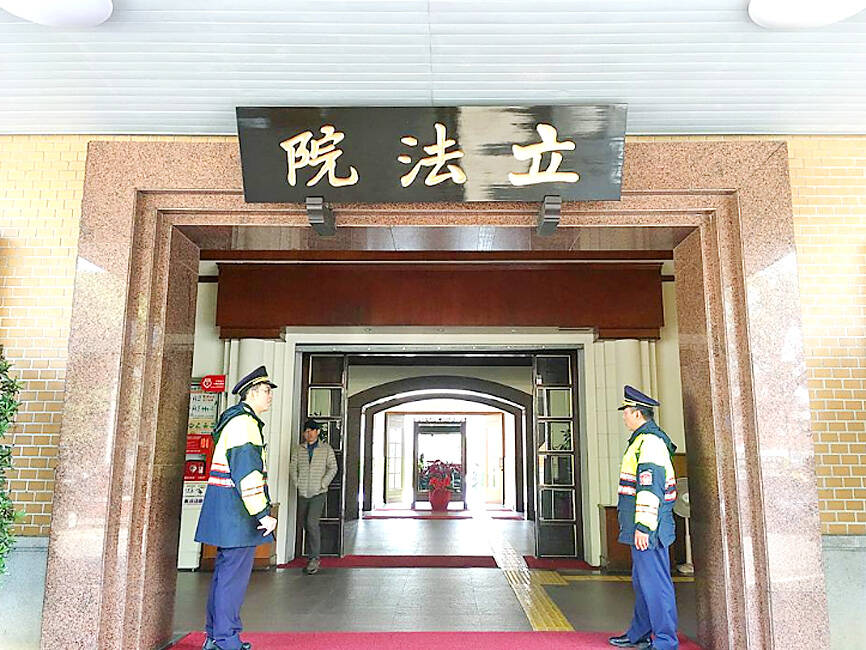Lawmakers across party lines have reached a consensus on some articles of a draft amendment that would loosen requirements for permanent residency.
The legislature’s Internal Administration Committee is to meet today to continue its review of draft amendments to the Immigration Act (入出國及移民法). Committee members have so far reached a consensus on some parts of the amendment, including the required length of stay in Taiwan for people to be eligible for permanent residence.
Under the amendment, holders of an Alien Permanent Resident Certificate would no longer be required to have lived in Taiwan for 183 days of every year, as long as they have been in Taiwan for that length of time on average over five years, the committee said.

Photo: Lin Liang-sheng, Taipei Times
This would add a degree of flexibility for foreign residents who stay in the country for longer periods in some years, but in other years go abroad for work or family matters, it said.
Committee members also reached an agreement on a stipulation that would change the rules for Taiwanese who do not have household registration in Taiwan (for example, those born abroad to Taiwanese parents).
Currently, they need to be in Taiwan for one year prior to applying for permanent residency, but the amendment would reduce the required length of stay to 335 days.
This would allow them to spend one month outside the country, in case there is a family emergency or other issue, the committee said.
Lawmakers also agreed to change a rule that affects foreigners who have divorced a Taiwanese if they have children in Taiwan from the marriage.
The current regulations stipulate that foreign divorcees can continue to reside in Taiwan only if they obtain custody of their dependent children after divorce. This would be annulled under the amendment.
Foreign divorcees who divorced due to domestic violence and have not remarried would also be allowed to continue their residence.

DEFENDING DEMOCRACY: Taiwan shares the same values as those that fought in WWII, and nations must unite to halt the expansion of a new authoritarian bloc, Lai said The government yesterday held a commemoration ceremony for Victory in Europe (V-E) Day, joining the rest of the world for the first time to mark the anniversary of the end of World War II in Europe. Taiwan honoring V-E Day signifies “our growing connections with the international community,” President William Lai (賴清德) said at a reception in Taipei on the 80th anniversary of V-E Day. One of the major lessons of World War II is that “authoritarianism and aggression lead only to slaughter, tragedy and greater inequality,” Lai said. Even more importantly, the war also taught people that “those who cherish peace cannot

STEADFAST FRIEND: The bills encourage increased Taiwan-US engagement and address China’s distortion of UN Resolution 2758 to isolate Taiwan internationally The Presidential Office yesterday thanked the US House of Representatives for unanimously passing two Taiwan-related bills highlighting its solid support for Taiwan’s democracy and global participation, and for deepening bilateral relations. One of the bills, the Taiwan Assurance Implementation Act, requires the US Department of State to periodically review its guidelines for engagement with Taiwan, and report to the US Congress on the guidelines and plans to lift self-imposed limitations on US-Taiwan engagement. The other bill is the Taiwan International Solidarity Act, which clarifies that UN Resolution 2758 does not address the issue of the representation of Taiwan or its people in

Taiwanese Olympic badminton men’s doubles gold medalist Wang Chi-lin (王齊麟) and his new partner, Chiu Hsiang-chieh (邱相榤), clinched the men’s doubles title at the Yonex Taipei Open yesterday, becoming the second Taiwanese team to win a title in the tournament. Ranked 19th in the world, the Taiwanese duo defeated Kang Min-hyuk and Ki Dong-ju of South Korea 21-18, 21-15 in a pulsating 43-minute final to clinch their first doubles title after teaming up last year. Wang, the men’s doubles gold medalist at the 2020 and 2024 Olympics, partnered with Chiu in August last year after the retirement of his teammate Lee Yang

The Philippines yesterday criticized a “high-risk” maneuver by a Chinese vessel near the disputed Scarborough Shoal (Huangyan Island, 黃岩島) in a rare incident involving warships from the two navies. The Scarborough Shoal — a triangular chain of reefs and rocks in the contested South China Sea — has been a flash point between the countries since China seized it from the Philippines in 2012. Taiwan also claims the shoal. Monday’s encounter took place approximately 11.8 nautical miles (22km) southeast” of the Scarborough Shoal, the Philippine military said, during ongoing US-Philippine military exercises that Beijing has criticized as destabilizing. “The Chinese frigate BN 554 was